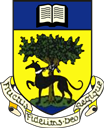A Short History
Linlithgow is a historic Royal Burgh located in the central lowlands of Scotland - about 20 miles from Edinburgh and under an hour from Glasgow by train or car.
Linlithgow Palace, birthplace of Mary Queen of Scots, is the highlight of this ancient burgh halfway between Falkirk and Edinburgh. This 15th century ruin is perfectly positioned beside Linlithgow Loch. Mary Queen of Scots was born here in 1542, becoming queen six days later. After a fire in 1424, James I started construction of the present palace, but this took over 200 years to complete.
Linlithgow Academy
Linlithgow Academy, as a separate institution, dates back just over 100 years: to the year 1894. However it was a natural successor to the educational establishment first mentioned in a Papal Bull of Pope Gregory VIII in 1187.
This 12th century establishment was a "Sang Schule" in the Kirkgate which trained choristers for services in St Michael's Church.
By the 16th century however some teachers such as Ninian Winzet, Robert Aitkenhead and Robert Nairn, were increasingly expressing their views that the school should, "teach and exhort the youth of the town in grammar, in the normal authors, and in good and civil manners".
By 1647 the Rector of Linlithgow Grammar School, as it was now called, was earning 100 pounds (Scots) a year and had an assistant called the "doctor" to assist him.
In addition to this basic salary the teacher could charge fees for teaching Latin or English. The town dominie was becoming a figure of some importance in the community and one of them, James Wiseman, was chosen to address King James VI on his visit to the burgh in 1617.
Discipline in those early days was brutal. Flogging with a rod or the tawse, public humiliation or ducking the head in a bowl of stale porridge: all were examples of the rigorous control exercised over a class which could number up to 100 pupils.
The school day started at 5.00am and lasted for 10 hours, with most lessons being conducted in Latin.
By the 17th century the importance of education was bringing the whole subject into increasing conflict between church and town. Rector James Kirkwood fell foul of the Linlithgow Town Council which he had reviled and was forced to flee.
The religious squabbles of the period hampered free learning and the Civil War, and the visit of Cromwell's troops who destroyed the old School house, further handicapped local education.
In the 1670's a new school was built and the town's bairns continued to be taught. In the 18th century their curriculum expanded to include "Geography, Book-keeping, French, Mathematics and Navigation".
The "Kirkgate School" lasted until 1816 when a new building was constructed. It was originally designed along "open plan" lines with all the pupils being taught in one large hall. However in 1839 the town council suggested partitioning the room and having the Rector teach in one half and the doctor in the other "in order to introduce a spirit of competition into the teaching".
Rector Low approved of the arrangement but his assistant was not so sure arguing that it would "engender bad feeling between the boys, not to mention between the teachers". The suggestion was duly dropped.
In 1872, under the new Education Act, the school was put under the control of the Burgh Board and, in 1876, the 350 pupils moved into yet another new building in the Rose Gardens. By 1880 numbers had risen to 443 and Inspectors' reports speak of overcrowding, bad hygiene and teaching difficulties among the seven staff. The problem was solved on February 26, 1902 when the Grammar school burned to the ground.
Meanwhile, in 1894 while life went on at the Grammar School, St Joseph's R.C. School and the Public School, yet another Linlithgow Educational establishment was about to open. Still discernible today on the facade of Longcroft Hall was inscribed:
"LINLITHGOW ACADEMY"
The log of 8 January 1894 records: "The School opens today under Mr Alex Muir M.A. and Miss Maggie McLaren, Assistant Mistress. There are registered 13 girls and 4 boys".
Since then there have been 10 Rectors of the Academy and the school roll has swollen to over 1200:
1894-1896 Alex Muir
1896-1929 James Beveridge
1929-1941 William Milne
1941-1951 William Baxter
1921-1954 Allan MacIntyre
1954-1967 Herbert C. Glennie
1967-1973 James Liston
1973-1989 John G. Ferguson
1989-2006 John G. Low
2007-2014 David A. MacKenzie
Further reading?




